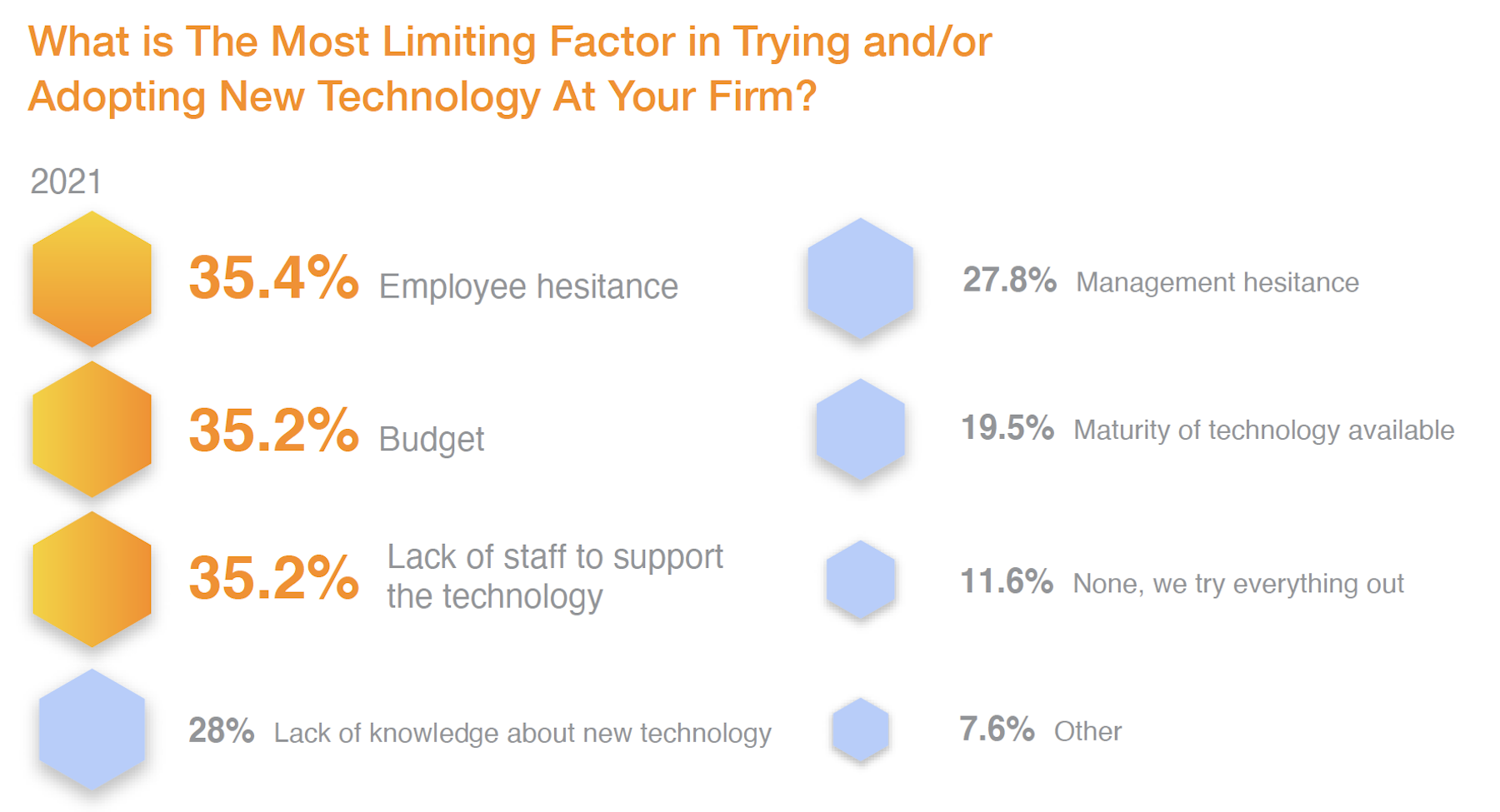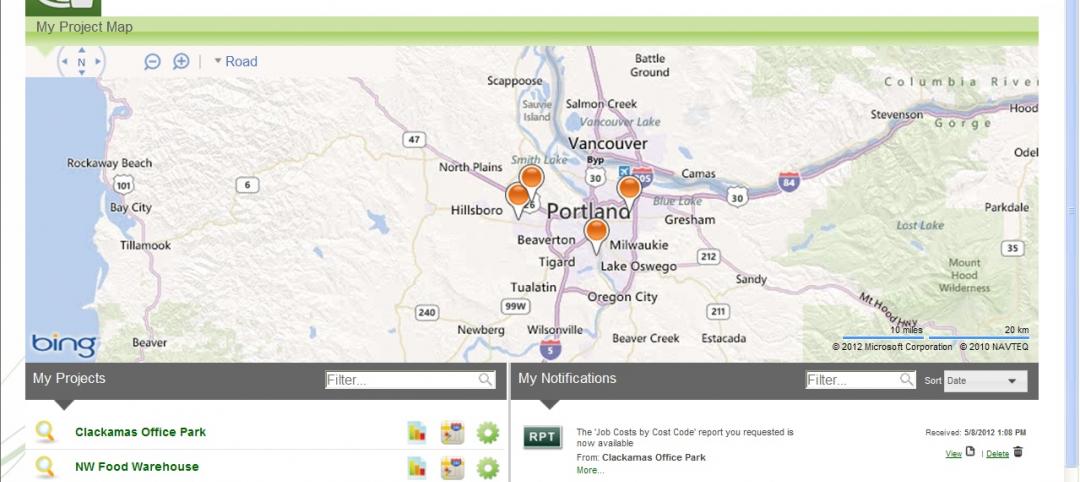In 2021, a record $4.5 billion were invested in Construction Technology startups, triple the amount in 2020, according Cemex Ventures. But there remains a disconnect between this outpouring for innovation and what’s actually being used in the field and back offices.
For example, less than half of contractor companies have departments dedicated to Information Technology, and even fewer don’t bill for IT expenditures. Over the past few years, construction companies have been reducing dedicated IT support and relying more on outsourcing some, if not all, of their IT functions.
Those are some of the findings that emerge from the 10th edition of JBKnowledge’s Annual Construction Technology Report, which was recently released. The report was produced in partnership with the Mechanical Contractors Association of America, the National Electrical Contractors Association, the Construction Financial Management Association, the Sheet Metal and Air Conditioning Contractors’ National Association, and the Construction Sciences Department of Texas A&M University.
JBKnowledge did not reveal the exact number of respondents to its survey except to tell BD+C that around 2,000 were from the construction industry in both field and administrative capacities. The survey was conducted in June and July 2021.
More than half of the total respondents to JBKnowleldge’s survey was between the ages of 42 and 61. Just over one-fifth (21 percent) was female, and the highest percentage of respondents (30 percent) was executives. Nearly three-quarters (73.8 percent) identified commercial building as their primary industry. While the survey received responses from 29 countries, 96.3 percent arrived from North America.
The report betrays an industry with too many companies that don’t prioritize IT. “Many construction companies fail to realize that an investment in IT will [lead to] greater profitability and increased ROI,” the report contends. “It’s no coincidence that construction companies are measuring on the lower-end of productivity as compared to other industries.”
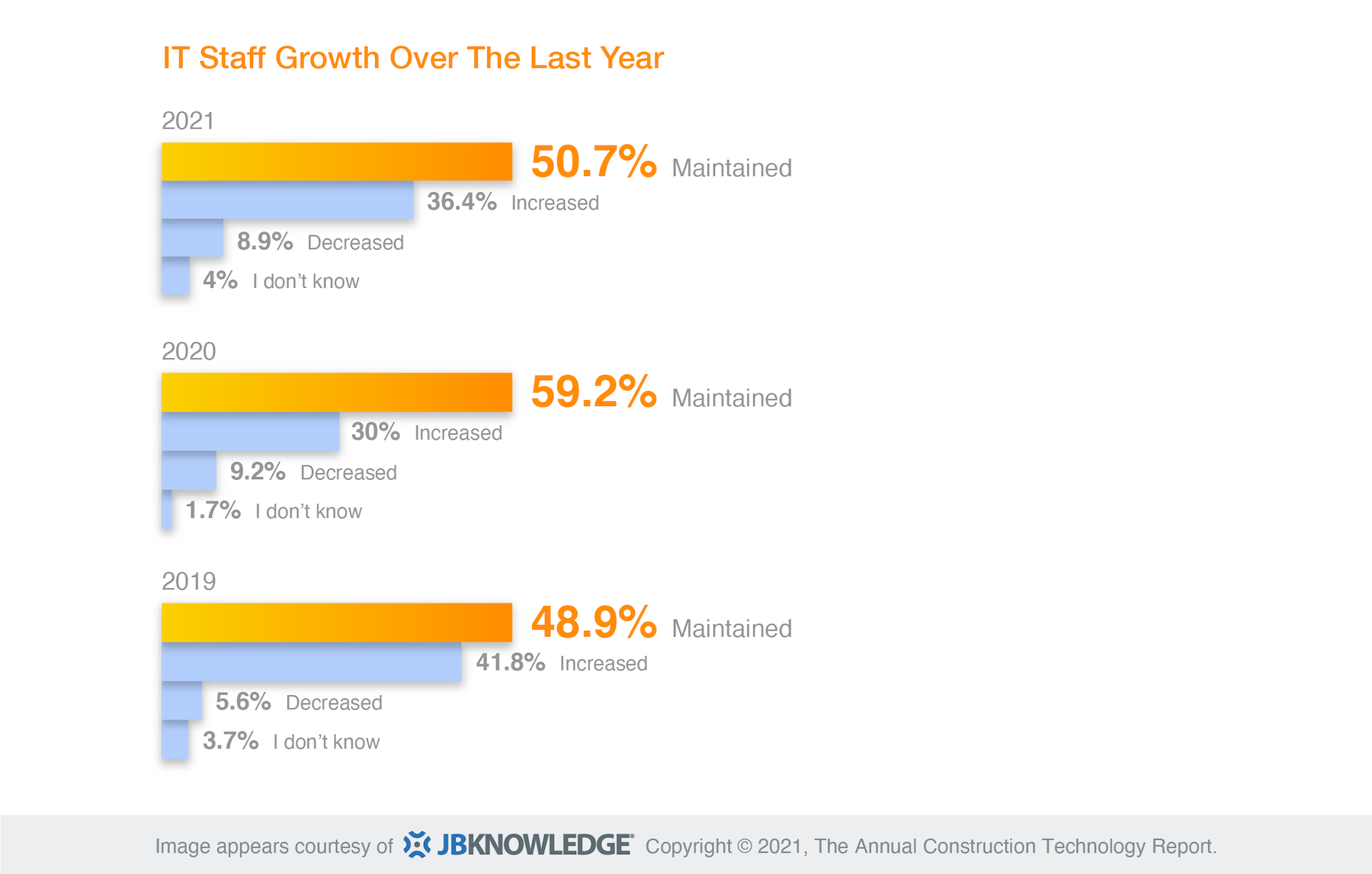
While three-fifths of those polled say their companies have between one and five employees dedicated to IT on their payrolls, more than one-third spends less that 1 percent of annual sales on IT. “Construction spending on IT is behind the curve.”
MOBILE APP INTEGRATION A CHALLENGE
The report is not without its contradictions. Respondents were generally satisfied with the IT training and resources their companies provided them. While 43.4 percent says their companies have dedicated R&D employees, 56 percent doesn’t have dedicated R&D budgets. “The most important thing to remember about Research & Development is: If you make R&D a ‘spare time’ endeavor, you will only receive ‘spare time’ results,” the report cautions.
More than half of the respondents says their companies’ cybersecurity includes using mobile device management, two-factor authentication, and cyber liability insurance. (Twelve percent of those polled says their companies experienced a data breach in 2021, and another 6 percent answered “I don’t know” to the question about breaches.)
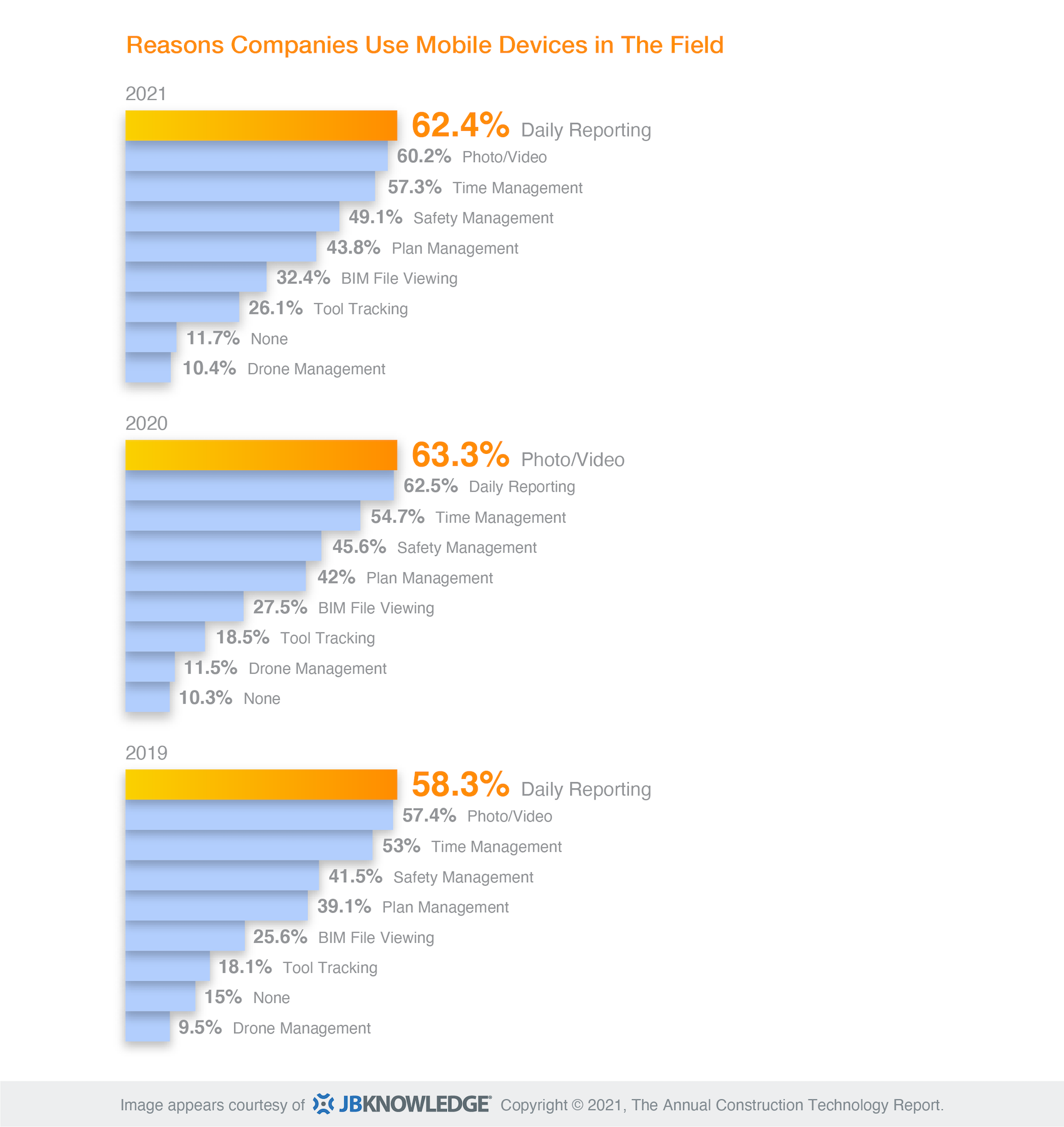
The top reason why respondents say they use mobile devices in the field is for daily reporting (62.4 percent), followed by photo/video capture (60.2 percent) and time management (57.3 percent) “Anyone who has been on the fence about whether a mobile app is necessary, the construction industry has spoken—mobile apps are key.” But technology integration remains a “big challenge” for many companies: more than half of all respondents still manually transfers data for apps without integrations. A surprising 15.3 percent of respondents doesn’t transfer data between apps at all, up from 11.8 percent in 2019.
Nearly all of those polled use smartphones for daily work purposes. But only around one-third says that their companies request that personal devices be secure and approved. (35.3 percent doesn’t use such personal devices at work.)
PREFAB A ‘COMPETITIVE ADVANTAGE’
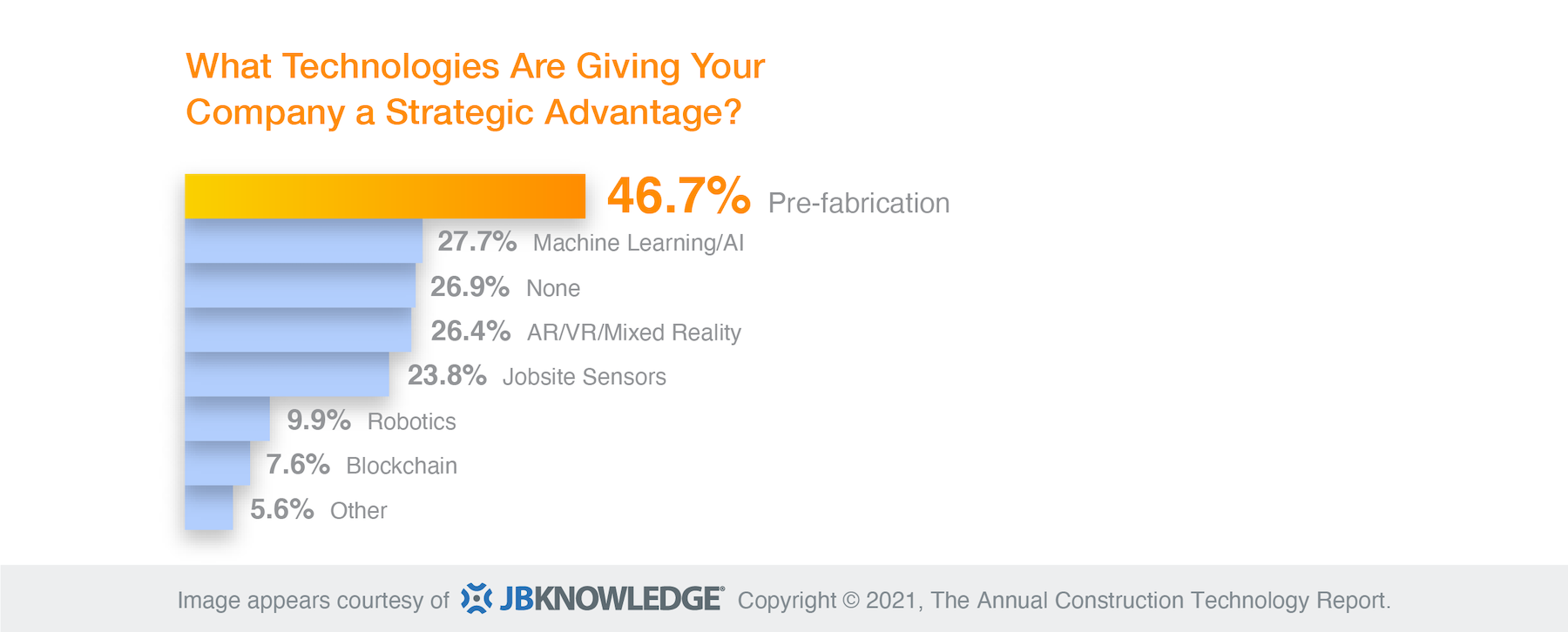
Based on the survey’s responses, Procore is the favored app for managing plans, daily reporting, safety management, time management, and image capture; Bluebeam for viewing BIM files; DroneDeploy for controlling drones; and ToolWatch for tool tracking.
Workflows likely to rely on dedicated software include accounting/ERP (83 percent), estimating (60.7 percent), and project management (58.2 percent). However, more than three-fifths of those polled say they still use spreadsheets for estimating instead of software, and more than two-fifths use spreadsheets over software for project management.
The most popular software includes Sage for accounting/ERP (21.3 percent of respondents cited it), OnScreen Takeoff for takeoffs (37.6 percent), custom in-house software for estimating (17 percent), BuildingConnected for bid management (31.2 percent), Microsoft Project for scheduling (59.8 percent), Procore for project management (46.2 percent), and Consential for client relationship management (32.4 percent).
As for tech innovations, 36.6 percent of respondents says their companies use drones on jobsites (although that percentage was down from previous years). And nearly two fifths (38.6 percent) say their companies have built with prefabricated components in the previous 12 months. Nearly half of respondents sees prefab as a competitive advantage.
Conversely, a portion of contractors still isn’t sold on Building Information Modeling (BIM): 35 percent says their firms outsource it, and 27.8 percent says their firms don’t bid on projects that involve BIM or Virtual Design and Construction (VDC). “The good news is, for the first time in the past five years more respondents reported their company had a BIM department,” the report states.
Related Stories
| May 24, 2012
2012 Reconstruction Awards Entry Form
Download a PDF of the Entry Form at the bottom of this page.
| May 23, 2012
New hospitals invest in data centers to manage growth in patient info
Silver Cross became one of the first hospitals to install patient tracking software so families know where a patient is at all times. New communication equipment supports wireless voice and data networks throughout the hospital, providing access to patients and their families while freeing clinicians to use phones and computers where needed instead of based on location.
| May 21, 2012
$61,000 awarded to students in Cleveland’s ACE Mentor Program
Mayor Frank G. Jackson gives keynote address at scholarship event for 80 Cleveland Metropolitan School District students involved in the ACE Mentor Program, which provides guidance and assistance for students interested in careers in the integrated construction industry.
| May 14, 2012
SMPS and Deltek announce alliance
A/E/C industry leaders partner to advance technology’s role in design firm marketing and business development.
| May 14, 2012
ArchiCAD e-Specs integration unveiled
Architects, engineers and construction professionals use InterSpec’s e-SPECS products on thousands of projects annually to maintain synchronization between construction models, drawings, and project specifications.
| May 9, 2012
International green building speaker to keynote Australia’s largest building systems trade show
Green building, sustainability consultant, green building book author Jerry Yudelson will be the keynote speaker at the Air-Conditioning, Refrigeration and Building Systems (ARBS) conference in Melbourne, Australia.
| May 7, 2012
2012 BUILDING TEAM AWARDS: TD Ameritrade Park
The new stadium for the College World Series in Omaha combines big-league amenities within a traditional minor league atmosphere.
| May 2, 2012
Trimble acquires SketchUp 3D modeling platform
The transaction is expected to close in the second quarter of 2012.


